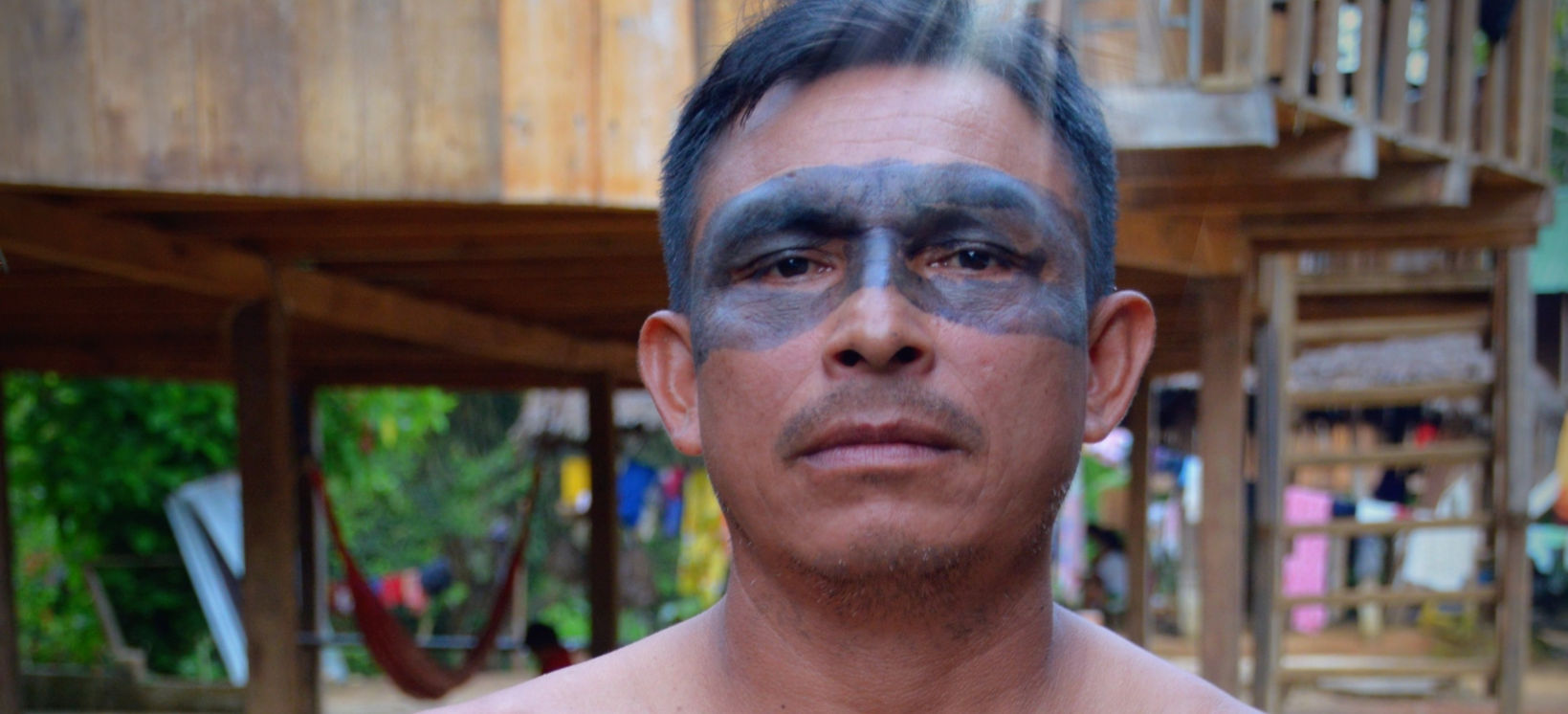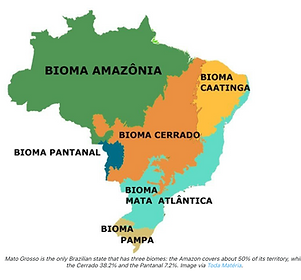
Threatening laws:
in Brazil
Brazil 2021-22:
Different submissions which endanger
indigenous territories / reservations
In mid-March 2022, a regional coordinator of FUNAI (National Indigenous Protection Agency) was arrested. The functionary, who is supposed to protect indigenous territories, has given land of the Xavante people in the state of Mato Grosso to large landowners as a "leasing project". This is not an isolated case.
Friends of the right-wing president Bolsonaro (2019-2022), have been trying for a long time to economically develop legally protected territories of indigenous peoples or to sell them off to national and international companies. Accordingly, they have prepared several laws to legalise their actions.
Draft legislation: "Marco Temporal"
"Marco Temporal" proposes that indigenous people only have a legal right to tribal land if they can prove that they were resident on that land on October 5th, 1988, the day of the proclamation of the constitution. A change of law would affect far more than a half of all the Brazilian tribes.
Hereby, many indigenous groups already expelled before this date were definitively “dispossessed” – for example, the Guaraní. But legalised indigenous territories such as that of the Xukuru, to whom the state gave approval only after 1988, were also to be affected.
The interpretation of the complex bill by human rights expert Jessica Carvalho Morris:
Jessica Carvalho Morris
Lawyer
is a dual US-Brazilian citizen, lawyer, researcher and human rights advocate. She has worked for over 10 years as executive director of non-profit organisations in the US and Brazil - including for Amnesty International.
Currently, she is pursuing a PhD in Human Rights at the Centre for Social Studies of the University of Coimbra, Portugal.
https://www.opendemocracy.net/es/author/jessica-carvalho-morris/

A ruling was expected from the Supreme Court in autumn 2021. But the Court adjourned indefinitely.
Jessica Carvalho Morris is worried. The current president of the Supreme Court, Edson Fachin, is on the side of the indigenous people, but Bolsonaro appointed two supporters to the highest justice bench.
Late August 2021, more than 6,000 indigenous people demonstrated in the capital Brasilia against the scheme.
Some of them clashed with Bolsonaro supporters and the police. More than 800 indigenous people stayed in tent camps for weeks to increase the pressure. Indigenous demos against discriminatory legislative restrictionsare also very visible in Chile and Argentina.

2023:
In the House of Representatives, indigenous leaders from all over Brazil
demand the immediate dismantling of "Marco Temporal".

After the transfer of power in January 2023 to Luiz Inácio "Lula" da Silva of the leftist Workers' Party, the political winds have shifted in favour of indigenous and traditional people. Lula has re-staffed and resourced the National Indigenous Protection Agency (Funai) and created a new Ministry of Indigenous and Traditional People. The cacique Marcos Xukuru became special advisor to the Indigenous Affairs Minister Sonia Guajajara.
The President of the Traditional People, Carlos Alberto Pinto dos Santos, has proposed to reorganise the approximately one hundred marine and land reserves ("RESEX") and adapt them to today's necessities.
In general, contemporary adjustments are also needed for Indigenous Territories, with their representatives now able to directly influence the relevant ministry and Indigenous MPs in this regard.
For example, at the end of March 2023, about two hundred indigenous leaders from more than 20 tribes from all over Brazil met with indigenous deputy Célia Xakriabá to demand the demarcation of their territories and the protection of the rights guaranteed by the 1988 Federal Constitution.
Their speeches expressed concern about the state of limbo caused by the Supreme Court's non-judgment on the "Marco Temporal". As a result, a sword of Damocles continues to hover over their heads, and legal uncertainty makes it difficult to demarcate and secure indigenous territories throughout the country. A quick solution is hardly in sight, as there are weighty interests behind the "Marco Temporal" that exert great pressure on all institutions.
Sept. 2023: House of Representatives has rejected "Marco Temporal"
The attempt by the agricultural industry to prevent indigenous communities from claiming land has just been struck down as unconstitutional by the Supreme Court of Brazil, with a vote of 9 against 2.
In April, Lula designated six new indigenous territories and guaranteed exclusive use of natural resources to indigenous peoples. These protected areas are seen by experts as an important measure against deforestation in the Amazon rainforest, which is one of the biggest challenges in fighting climate change.
Dez. 2023: Congress has reinstated "Marco Temporal"
In a joint session of both parliamentary chambers, 321 deputies and 53 senators voted in favor of the articles. President Luiz Inácio Lula da Silva suffered a major defeat as his veto was overridden and the Supreme Court's ruling was nullified.
Currently, it is not yet clear how the constitutional crisis between the legislative, judicial, and executive branches will develop. The Indigenous Federation APIB has announced plans to file an expedited constitutional lawsuit against the cut-off date provision "Marco Temporal".
More draft legislations
PL 337
A new bill was introduced in the Brazilian lower house in May 2022. It aims to legally separate the state of Mato Grosso from the Amazon region. It includes three of Brazil's most important biomes - the Amazon, the Cerrado steppe and the Pantanal wetlands. Until now, it has belonged to the Amazon subregion along with eight other states (Acre, Amapá, Amazonas, Pará, Rondônia, Roraima, Tocantins and parts of Maranhão).
This entails tax advantages, but also environmental protection requirements. For example, farms must leave 80% forest on their land and can only clear 20%. The agro-industry argues that this is no longer enough to feed the growing population in Brazil and the world. Resistance to pesticides and the resulting depleted and impoverished soils, together with climate change, are putting pressure on crop yields and the profitability of the soy barons. Therefore, they are pushing to open up more and more new areas.

PL490
According to this legislation, individual federal states can in the future permit indigenous reservations to be released for mining. An area affected would be, for example, the territory of the Munduruku tribe in Pará, where gold has been discovered. On Munduruku land gold miners set fire to the houses of indigenous people; canoes containing children of the Yanomami were rammed and the villages were shot at. The federal police also came under fire by the gold miners. In the vicinity of Itaipú on the Tapajos river gold is already being mined by one company. It is not only PL 490 that smooths the way for large-scale landowners and gold miners, but the evangelical preachers do also.

In March 2022, the Senate passed the government's bill PL490 by 279 votes to 180. It allows mining in protected indigenous areas. In Brasilia, environmentalists, indigenous people and artists demonstrated against the project.
It is not only PL 490 that smooths the way for large-scale landowners and gold miners, thereby contaminating huge areas with mercury, but the evangelical preachers do also. They control an important faction in Congress and support Bolsonaro.
See National Geographic:
But not all indigenous people are critical of the laws. Again and again there are divisions within the communities, and some indigenous people succumb to the temptations and the money of the West, but are mostly unaware of what the contamination of the environment during the extraction of gold also means for their own health.

Since 50 years, the Catholic organisation "Indigenous Missionary Council-Cimi" has been supporting the indigenous population. (see)
For its 50th anniversary, "Cimi" has in 2023 launched a campaign:
"We are coming out of a very dark night," said Deputy Secretary Luis Ventura. "We have to use the next four years to move forward. But it will not be easy. Now is the time to create a task force. The power of indigenous people has never been greater. We need a strategy.

